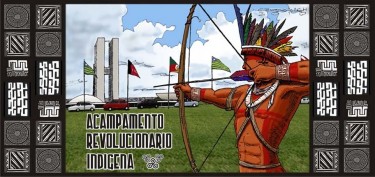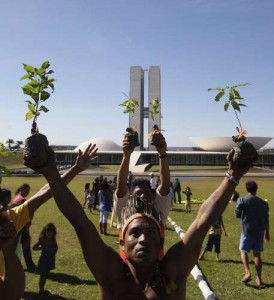This post is part of our special coverage Forest Focus: Amazon [1].
Since early in January this year, members of different indigenous Brazilian nations have been camping out in front of the Ministry of Justice in Brasília D.F. The indigenous communities accuse the government and FUNAI [2] (Fundação Nacional do Índio) [pt] – the national protection agency for the indigenous peoples in Brazil – as well as Non-Governmental Organizations (NGO’s), of betrayal for not consulting indigenous leaders in matters concerned to them. In March, AIR (Acampamento Indígena Revolucionário – Revolutionary Indigenous Camp), launched a blog [3] [pt] where it laid out its claims.
Nós guerreiros e guerreiras das etnias Pankararu, Korubo, Mundurucu, Krahô-Canela, Fulni-ô estamos há mais de 70 dias acampados na frente do Congresso Nacional, em Brasília, com o objetivo da revogação do Decreto 7.056/09 da Funai e da saída da cúpula mafiosa da Funai, CNPI, ISA e demais Ong's, que têm como finalidade exterminar os indígenas no Brasil.
O decreto 7.056 foi publicado no dia 28 de dezembro de 2009, de forma autoritária, em que os líderes não foram ouvidos e o presidente da Funai junto com as Ongs passaram por cima dos direitos indígenas e em leis internacionais como o artigo 169 da OIT, que redige que os indígenas têm que ser escutados em quaisquer decisões relacionados à eles.“Índio é terra e não dá para separar.”
We warrior men and women of the Pankararu, Korubo, Mundurucu, Krahô-Canela and Fulni-ô ethnicities, are camped out for over 70 days in front of the National Congress in Brasília, aiming the end of Decree 7.056/09 related to Funai, and the exit of the mafia on the board of FUNAI, CNPI, ISA and other NGO's, which have the objective of exterminating the Brazilian indigenous people.
Decree 7.056 was published on December 28th, 2009, in an autoritarian way, where our leaders were not consulted and FUNAI’s President together with the NGO’s overlooked indigenous rights and international laws such as article 169 of OIT, which says that the indigenous must be heard in any matter concerning them.
The indian is land and nothing can separate them.
The mentioned Decree 7.056/09 was treated by congress as a restructuring of the FUNAI but indigenous groups say that, in practice, it closes 24 administrative offices, 9 area offices and all village posts [5] [pt]:
A ausência desses postos foi severamente prejudicial a todas as comunidades de todo o território nacional, pois, o único apoio vindo da Funai – ainda que precário – vinha das administrações e postos.
Among the 11 demands [6] [pt] that the indigenous representatives put forward are: the creation of CNDI (Conselho Nacional de Direitos Indígenas – National Council for Indigenous Rights) – which would give the indigenous people autonomy in the management of their patrimony, rights and interests -, the consulting of indigenous peoples in matters related the environment and the defense of their social, cultural and religious rights, respect for indigenous land and its natural resources. The indigenous also demand the exoneration of the President of FUNAI, Márcio Meira, and his team, for failing to attend to the above demands. In its blog, FUNAI defends its position [7] claiming to have treated, along their 3 year old existence, over 30 cases such as [pt]:
Violência e criminalização de lideranças e comunidades indígenas; conflitos territoriais envolvendo indígenas; população carcerária indígena no Brasil; operações policiais em terras indígenas; a regularização fundiária de terras indígenas; o etnodesenvolvimento dos povos indígenas; o Estatuto do Índio; aproveitamento de recursos naturais, minerais, hídricos e florestais presentes em terras indígenas; educação indígena, pesquisa das línguas indígenas; a situação de extrema vulnerabilidade do povo Guarani Kaiowá; reformulação da política de atendimento e subsistema de saúde indígena; reestruturação, planejamento estratégico e Plano Plurianual do órgão indigenista.
In an open letter to the Brazilian people, published on their website and reproduced [8] [pt] in other blogs, AIR accuses FUNAI of contributing to a national development that is not in the best indigenous interest, in fact it clashs with it:
Em nome de um crescimento econômico pleiteado por toda a Nação, temos nossos territórios impactados por estradas, ferrovias, hidrelétricas e outros empreendimentos, todos aprovados pela FUNAI com um simples “sem óbices ao empreendimento x ou y“, sem que nesse processo se garanta o pleno cumprimento da legislação ambiental e indigenista que ainda está em vigor.
During May and June other indigenous ethnicities joined the revolutionary campers, among whom, over 100 Guajajaras and representatives from Kayapó, Tapayuna e Panará groups [9] [pt]. But, in July a bitter event farther aggravated the crisis between the indigenous leaders and the authorities supposedly created to protect indigenous rights. On july 10th [10], different police forces entered the Indigenous revolutionary camp, without a judicial warrant, destroying tents and taking cooking objects and clothes. In a direct confrontation with the indigenous protestors, the police used pepper spray injuring women and children, including a pregnant woman who later aborted in hospital.
But the Indigenous Revolutionary camp [3] resists, standing in defiance by the Ministry of Justice, though recently moved by the police [11] to the front of Itamaraty Palace, while they await the annulment of Decree 7.056/09.
This post is part of our special coverage Forest Focus: Amazon [1].

